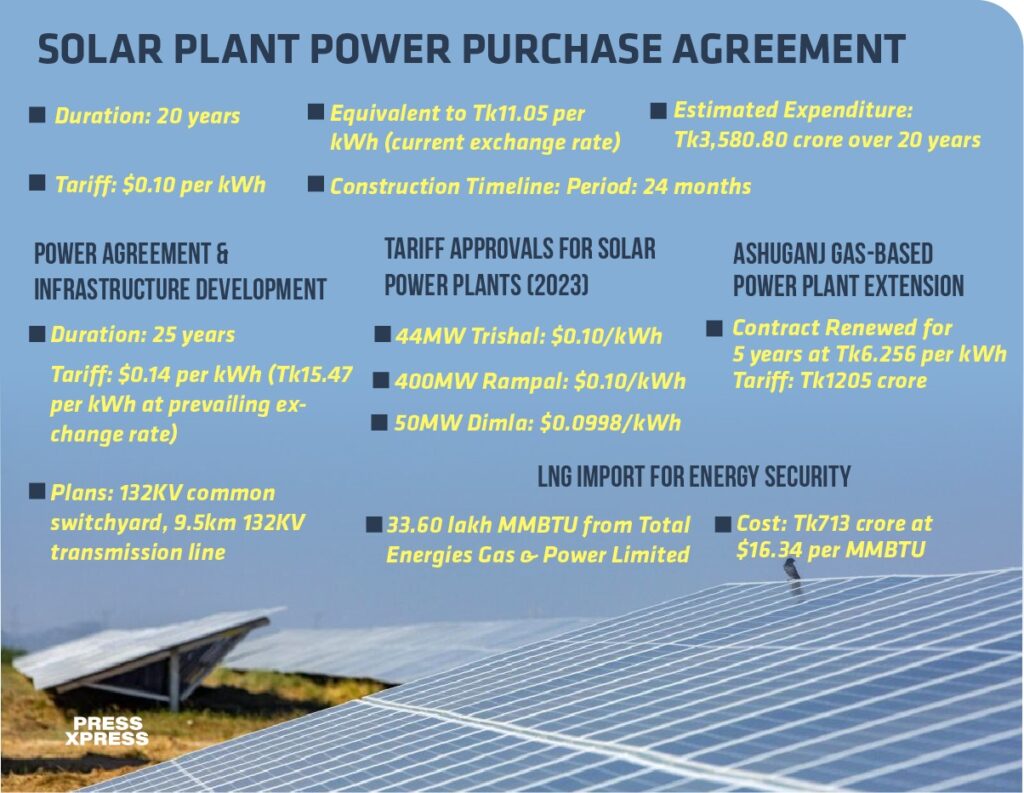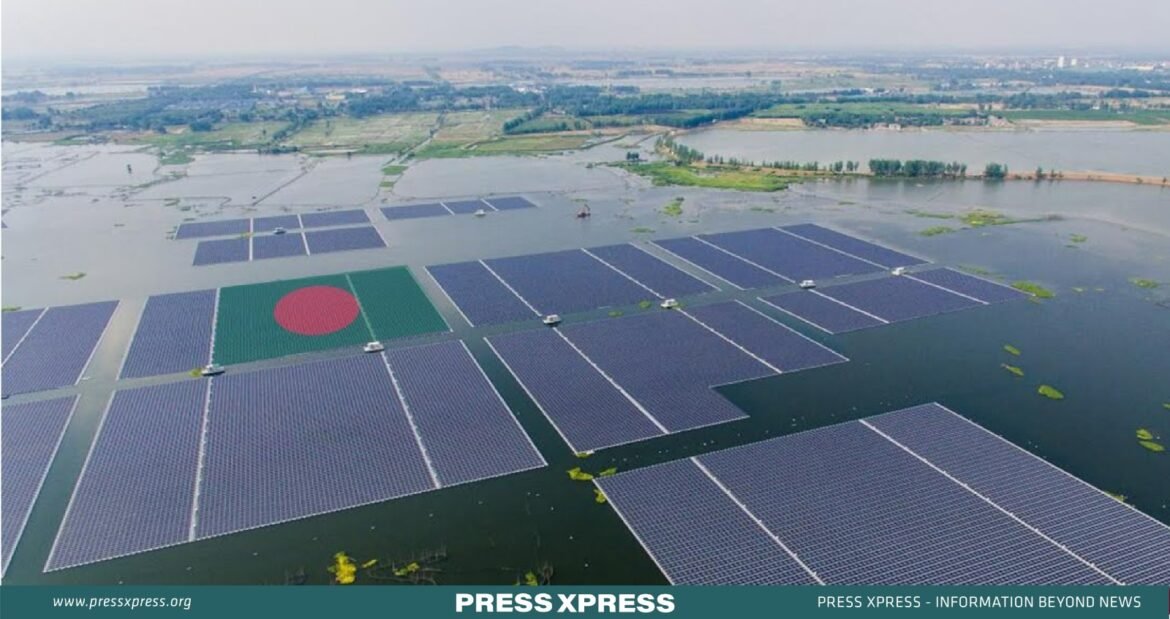Bangladesh has been actively investing in solar power to address its growing energy needs while mitigating climate change’s impact. The country has made significant progress in establishing solar power plants and promoting renewable energy sources, particularly solar power. As the country continues to invest in solar power, it is well-positioned to positively impact both its energy sector and the environment.
You can also read: Feni’s 100MW Solar Plant Illuminating Bangladesh’s Green Energy Revolution
The government’s recent approval of a 100MW solar power plant in the private sector, under the “no electricity, no payment” arrangement, underscores its commitment to sustainable energy initiatives. A Chinese consortium of Cassiopea Fashion Limited, Xizi Clean Energy Equipment Manufacturing Company, and Cassiopea Apparels Limited, is poised to spearhead the development of this solar power facility in Gouripur, Mymensingh on a “Build, Own and Operate” basis.
Meanwhile, the Cabinet Committee on Public Procurement, presided over by Finance Minister AHM Mustafa Kamal, recently granted its official approval for the proposed tariff structure of the solar power plant.
Tariff Agreement and Expenditure Projection
As per the ratified tariff, the government will procure power from the solar plant for the next 20 years at a rate of $0.10 per kilowatt-hour (kWh), comparable to Tk11.05 per kWh based on the present-day exchange rate. In line with the current exchange rate, the total outlay of the government on procuring power from this facility is estimated at Tk3,580.80 crore over two decades. The construction of the solar power plant is expected to unfold over a period of 24 months.
Government’s Vigilance on Exchange Rates’ Effect on Electricity Expenditure
Notably, the government will consider the dollar-taka exchange rate of Sonali Bank on the first day of a month after the billing month in paying the electricity bill. Consequently, if the taka depreciates, the cost of electricity will correspondingly rise.
This undertaking stands as a testament to the government’s unwavering dedication to fostering the growth and diversification of renewable energy resources. Hence, it is encouraging private sector contribution in power generation through using solar energy, the major source of renewable energy.

Solar Power Expansion Plans
An official has affirmed that the sponsoring company will oversee the comprehensive financial responsibilities of the entire project, encompassing the acquisition of essential land resources, the establishment of power transmission infrastructure, and the construction of necessary substations.
The sponsoring company had submitted a power purchase agreement to the Power Division for a duration of 25 years, proposing a tariff of $0.14 per kWh, equivalent to Tk15.47 per kWh at the prevailing exchange rate.
As stipulated in the documentation forwarded by the Power Division to the Cabinet Committee on Public Procurement, plans include the construction of a 132KV common switchyard at the prospective solar power plant. Additionally, a 9.5km 132KV double circuit transmission line is slated for development, extending to the under-construction Shambhuganj grid substation. The sponsor company is tasked with both the construction of the transmission line and providing the requisite land.
The Cabinet Committee on Public Procurement approved the tariffs for three solar-based power plants from April to August (2023). Among them, the tariff of 44MW power plant at Trishal of Mymensingh and 400MW power plant at Rampal were fixed at $0.10/kWh. Furthermore, the tariff of 50MW power plant at Dimla of Nilphamari was fixed at $0.0998/kWh.
Furthermore, there is an ongoing proposal for the construction of another 100MW solar-based power plant in Trishal, which will be executed by a consortium comprising Total Fren SA Ltd and gchQ Anand Energy pte ltd.
The Cabinet Committee also endorsed an extension of the term and tariff for the Ashuganj 55MW gas-based rental power plant. The government’s second phase contract with the sponsor company, Precision Energy Limited, expired in April, prompting the company to propose an extension. Subsequently, the committee granted a renewal of the contract for a five-year period at Tk6.256 per kWh under the “no electricity, no payment” arrangement. This extended term will see the sponsor company receive Tk1205 crore as tariff.
Meanwhile, the cabinet committee also agreed a proposal to import 33.60 lakh MMBTU of LNG from the spot market. Total Energies Gas & Power Limited will provide the LNG at around Tk713 crore at $16.34 per MMBTU.
This move underlines the government’s continuous efforts to diversify energy sources and ensure the nation’s energy security.
Bangladesh’s Clean Energy Odyssey and Ongoing Project
Bangladesh is currently engaged in the development and evaluation of over a dozen large-scale solar power projects, including three with a remarkable 1,000MW capacity each, aimed at joining the ranks of global leaders in the gigawatt club, such as China, India, and the UAE.
Since 2013, the 33rd Infantry Division of the Bangladesh Army has been overseeing the 370-square-kilometer island, implementing various development initiatives, and establishing a dedicated exercise base.
In 2017, Bangladesh embarked on the construction of a vast solar facility featuring approximately five million solar panels. A 132-kilovolt, 35-kilometer-long power transmission line was erected to connect the generated electricity to the national grid. Furthermore, substations, equipment, and inverters were strategically installed, spanning from Teesta Ghat in Sundarganj to Rangpur. This impressive 200 MW solar plant surpasses the 134.3 MW plant owned by Energon Renewables Ltd, a subsidiary of the Orion Group, located in Mongla.
According to sources within the Energy Ministry, the government is actively reviewing or implementing significant solar projects in various regions, including Sreemangal, Moulvibazar (300MW), Mongla, Bagerhat, and Thakurgaon (both 200MW).
State Minister for Energy and Power, Nasrul Hamid, reports that Bangladesh currently generates 1,194 MW from renewable sources, with only 825.23 MW integrated into the national grid. Furthermore, an additional 1,262MW of renewable energy power plants are under construction through 30 projects, while a substantial 8,668MW of projects are in the planning stages.
In its commitment to renewable energy, Bangladesh has installed over six million Solar Home System (SHS) units since 1996, along with thousands of rooftop units, solar-powered street lighting, telecom BTS, and solar irrigation units. Additionally, several private companies have established small-scale off-grid solar power plants, further promoting the adoption of renewable energy sources.


